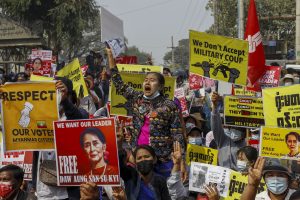The world is replete with crises ranging from Russia’s invasion of Ukraine to China’s saber-rattling over Taiwan. With the U.S. economy still reeling from persistent inflation and new COVID-19 cases on the rise, American interest in distant conflicts in seemingly remote parts of the globe is waning.
However, the United States should not lose sight of the escalating humanitarian and political crisis in Myanmar. There are clear national and moral interests at stake.
Although the February 2021 coup d’état that overthrew the democratically elected civilian government in Myanmar served as the Biden administration’s first foreign policy crisis, it was soon subsumed by others. The withdrawal from Afghanistan last year and then Russia’s invasion of Ukraine a year after the coup have dominated Washington policymakers’ attention.
Beyond targeted sanctions on the junta, the occasional diplomatic engagement, and humanitarian aid, Washington has provided relatively little material assistance to Myanmar’s resistance or the National Unity Government (NUG), which formed following the coup. Amid a widening civil war in Myanmar, the United States allocated $136 million in the Consolidated Appropriations Act for “assistance” to Myanmar, while the National Defense Authorization Act for 2022 called for Washington to “support and legitimize the National Unity Government… the Civil Disobedience Movement… and other entities promoting democracy.”
Yet, by contrast, policymakers have given far more attention and funding to support Ukraine. In mid-June, the Pentagon authorized an additional $1 billion in security assistance for Ukraine, on top of Congress’ recent approval of a $40 billion aid package the month before.
While other global and domestic crises necessitate attention, expanding support for Myanmar’s pro-democracy movement makes sense both to advance U.S. national security interests and to defend human rights and democracy.
The Biden administration claims that the Indo-Pacific is its “priority theater,” especially as it rolls out new initiatives designed to counter China’s rise. Myanmar lies at the crux of this geostrategic region where South Asia, Southeast Asia, and China meet. Authoritarian instability here affects U.S. allies and partners and undermines the “free and open Indo-Pacific” that Washington seeks to defend.
Chaos in Myanmar has also divided the regional Association of Southeast Asian Nations (ASEAN), a critical partner in the Indo-Pacific. In April, the United States and ASEAN committed to upgrading their relationship to a comprehensive strategic partnership, but Myanmar is a member of the 10-nation regional group. Although ASEAN has prevented senior junta leaders from attending its summits since October, ignoring the escalating conflict in Myanmar hampers ASEAN’s unity and leaves it open to influence from Russia and China.
The junta will be a source of instability for the foreseeable future. If the military suppresses the democratic resistance in Myanmar, it will remain an isolated, rogue actor due to its rampant war crimes, Western sanctions, and increasing alignment with Moscow and Beijing.
Moreover, human rights and democracy are still vital to U.S. foreign policy. Russia and China both support the junta amid their global autocratic resurgence, and only a democratic, federal Myanmar can stabilize the country in the long-term. Indeed, Myanmar’s struggle for democracy mirrors that of the United States today. Both are grappling with volatile internal debates over national identity that hinge on divisions around issues of race, religion, and individual rights.
In pursuit of these interests, there are several ways that the United States can constrain the junta, including financial as well as diplomatic levers. The United States could release the $1 billion in the Federal Reserve Bank of New York, which the Biden administration swiftly froze following the military takeover. Second, Washington could offer financial assistance for the pro-democracy movement, as specified in the BURMA Act of 2021, which allocates $250 million over five years to support civil society and over $220 million for humanitarian aid in FY2023. More funding would alleviate the NUG’s financial burdens and help the victims of Myanmar’s humanitarian crisis and war.
On the diplomatic front, the United States could do more to interface with the NUG to lend it further credibility and enhance its efforts to engage the United Nations and other fora, such as ASEAN. Barring full recognition of the NUG, expanding regular official engagement will go a long way toward raising the pro-democracy movement’s international profile. While senior Biden administration officials and members of Congress have already held meetings with NUG officials, the Biden administration can do more to publicize these engagements to lend moral support, as well as facilitate the NUG’s interactions with other countries.
These efforts should also include working bilaterally with like-minded ASEAN partners, such as Indonesia, Malaysia, and Singapore, who have led Southeast Asia’s efforts to counter the coup. Finally, U.S. diplomacy should work to get its democratic allies Australia and Japan on board with sanctions and other engagement efforts, along with cooperation from India and Thailand, who are more open to the junta.
As the fallout from Myanmar’s coup continues to destabilize the region and devastate its people and economy, the United States should reprioritize its commitment to the country’s democracy. Myanmar’s struggle for democracy should not be forgotten, and addressing the coup remains of critical importance for U.S. national security and values.
The views expressed are the authors’ alone, and do not represent the views of the U.S. Government or the Wilson Center.

































